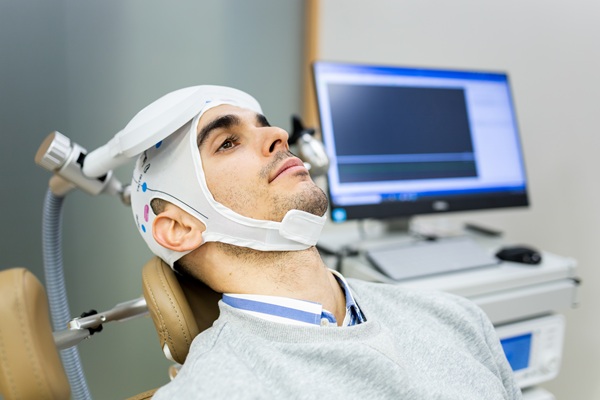What Are the Side Effects of TMS Therapy?

Looking for more information on TMS therapy? According to Harvard Health, depression is the leading cause of disability in the United States among people ages 15 to 44. This fact has made it so there are many treatments available for those suffering from depression nowadays.
While anti-depressants and psychotherapy are two of the more common types of treatments available, these treatment options do not work for everybody. When these common treatment options do not work, it is necessary for those suffering to seek other treatment options so they can live a happy and fulfilling life.
What is TMS therapy?
Transcranial magnetic stimulation, also known as TMS therapy, stimulates the brain in a way that is noninvasive, making it a common treatment option amongst those suffering from depression. The device used in this type of therapy directs powerful magnetic fields to certain areas of the brain that are known to be responsible for causing depression.
Patients who choose TMS therapy will need to fully commit as they are required to undergo treatment sessions five days a week over the course of four to six weeks.
What are the side effects of TMS therapy?
The following is a list of some of the more common side effects those suffering from depression can potentially experience when undergoing TMS therapy.
Headaches
A headache is the most common side effect someone will experience when undergoing TMS therapy. These headaches will range anywhere between mild and moderate and tend to slowly diminish as the patient undergoes each treatment. If necessary, patients can choose to use over-the-counter medications to address any discomfort or pain they are experiencing.
Scalp irritation
Experiencing irritation to the scalp is a common side effect and tends to go away after the first week or two of treatment. If the irritation persists after this amount of time, the medical professional performing the treatments may reduce the strength of the magnetic field pulses.
Lightheadedness, dizziness
Some patients will experience a little lightheadedness or dizziness, which tends to diminish as soon as one of the treatment sessions is over.
Seizures
While seizures are a potentially serious side effect that comes with TMS therapy, the chances of someone experiencing a seizure are extremely small. Since all patients are required to undergo a screening test before they are approved for this type of therapy, medical professionals will specifically look for any conditions associated with seizure disorders.
Are you currently suffering from depression?
Are you interested in utilizing TMS therapy to help you deal with your depression? Or maybe you have a child who is in need of treatment? TMS therapy is a safe therapy option that works for both children and adults. Its noninvasive nature is a common reason why so many people who have been diagnosed with depression are choosing to undergo this therapy option. If you would like to make a consultation appointment, we invite you to contact our office today.
Are you considering TMS therapy in the Columbia area? Get more information at https://futurepsychsolutions.com.
Check out what others are saying about our services on Yelp: Read our Yelp reviews.
Related Posts
Depression can be difficult to manage, particularly for those who do not respond to traditional antidepressants and other methods. In these cases, spravato for depression offers a new and effective psychiatric treatment option. This FDA-approved medication, also known as esketamine, is administered as a nasal spray under medical supervision. It has shown remarkable results for…
Treatment-resistant depression can leave patients feeling stuck, even after exploring different medications and approaches to therapy. The good news is that TMS therapy, or transcranial magnetic stimulation, offers a new way forward. This innovative and noninvasive psychiatric treatment aims to restore healthy communication between brain regions responsible for mood, emotion, and focus, providing a path…
Ketamine therapy is an effective treatment method for treatment-resistant mental conditions, such as depression, anxiety disorders, and post-traumatic stress disorder (PTSD). However, common misconceptions may prevent individuals from choosing this treatment and obtaining the relief they need. Our team is here to dispel the three most common myths surrounding ketamine therapy so you can make an…
Adult psychiatry can help bring relief to those struggling with their mental health. Psychiatrists complete specialized training in treating various mental disorders, from clinical depression to anxiety, and more. Whether you or a loved one has been diagnosed with a mental disorder or does not know what the issue is, psychiatric treatment may help. Below…


